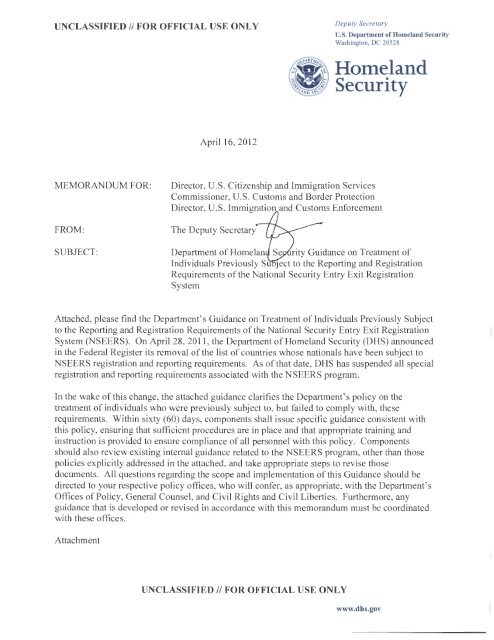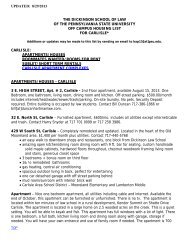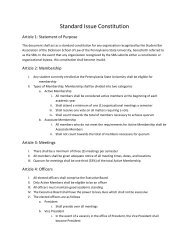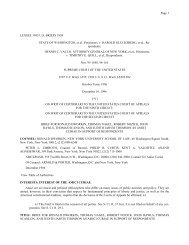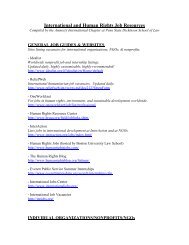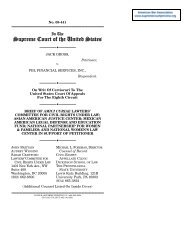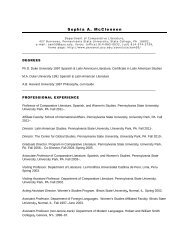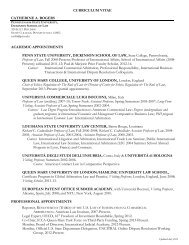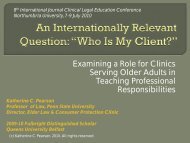Homeland Security - Penn State Law
Homeland Security - Penn State Law
Homeland Security - Penn State Law
Create successful ePaper yourself
Turn your PDF publications into a flip-book with our unique Google optimized e-Paper software.
UNCLASSIFIED II FOR OFFICIAL USE ONLY<br />
Deputy Secretary<br />
U.S. Department of <strong>Homeland</strong> <strong>Security</strong><br />
Washington, DC 20528<br />
<strong>Homeland</strong><br />
<strong>Security</strong><br />
April 16,201 2<br />
MEMORANDUM FOR:<br />
FROM:<br />
SUBJECT:<br />
Director, U.S. Citizenship and Immigration Services<br />
Commissioner, U.S. Customs and Border Protection<br />
Director, U.S. Immigration and Customs Enforcement<br />
The Deputy Secretary<br />
Department of Hom elan ity Guidance on Treatment of<br />
Individuals Previously Su to the Reporting and Registration<br />
Requirements of the National <strong>Security</strong> Entry Exit Registration<br />
System<br />
Attached, please find the Department's Guidance on Treatment oflndividuals Previously Subject<br />
to the Reporting and Registration Requirements of the National <strong>Security</strong> Entry Exit Registration<br />
System (NSEERS). On April 28, 2011 , the Department of <strong>Homeland</strong> <strong>Security</strong> (DHS) announced<br />
in the Federal Register its removal of the list of countries whose nationals have been subject to<br />
NSEERS registration and reporting requirements. As of that date, DHS has suspended all special<br />
registration and reporting requirements associated with the NSEERS program.<br />
In the wake of this change, the attached guidance clarifies the Department' s policy on the<br />
treatment of individuals who were previously subject to, but failed to comply with, these<br />
requirements. Within sixty (60) days, components shall issue specific guidance consistent with<br />
this policy, ensuring that sufficient procedures are in place and that appropriate training and<br />
instruction is provided to ensure compliance of all personnel with this policy. Components<br />
should also review existing internal guidance related to the NSEERS program, other than those<br />
policies explicitly addressed in the attached, and take appropriate steps to revise those<br />
documents. All questions regarding the scope and implementation of this Guidance should be<br />
directed to your respective policy offices, who will confer, as appropriate, with the Department's<br />
Offices of Policy, General Counsel, and Civil Rights and Civil Liberties. Furthermore, any<br />
guidance that is developed or revised in accordance with this memorandum must be coordinated<br />
with these offices.<br />
Attachment<br />
UNCLASSIFIED II FOR OFFICIAL USE ONLY<br />
www.dhs.gov
UNCLASSIFIED II FOR OFFICIAL USE ONLY<br />
Department of <strong>Homeland</strong> <strong>Security</strong><br />
Guidance on the Treatment of Individuals Previously Subject to the Reporting and Registration<br />
Requirements of the National <strong>Security</strong> Entry Exit Registration System (NSEERS)<br />
Purpose<br />
On April28, 2011 , through a notice published in the Federal Register, the Department of<br />
<strong>Homeland</strong> <strong>Security</strong> (DHS) removed the list of countries whose nationals have been subject to<br />
NSEERS registration and reporting requirements. The notice also announced that DHS would<br />
no longer register aliens under the NSEERS program. It did not give guidance on how DHS<br />
Components should treat aliens' past failure to comply with special registration and reporting<br />
provisions. This memorandum provides this guidance and also clarifies that, as of<br />
April28, 2011 , DHS has suspended all special registration and reporting requirements associated<br />
with the NSEERS program. This suspension applies to all aliens previously subject to NSEERS<br />
requirements, whether or not the alien was a national of one of the previously designated<br />
countries and regardless of the underlying basis for the alien' s inclusion in the NSEERS<br />
program.<br />
Unless specifically exempted herein, this guidance applies to and is binding on all DHS<br />
personnel.<br />
Authority<br />
Applicable authority includes:<br />
• Sections 212, 214, 263, 264, and 265 of the Immigration and Nationality Act (INA),<br />
8 U.S.C. §§ 1182, 1184, 1303, 1304, and 1305;<br />
• 8 C.F.R. §§ 214.1(f) and 264.1(f); and<br />
• Department of <strong>Homeland</strong> <strong>Security</strong>, Office of the Secretary, Removing Designated<br />
Countries from the National <strong>Security</strong> Entry-Exit Registration System (NSEERS) ; Federal<br />
RegisterNol. 76, No 82/Thursday, April28, 2011.<br />
This memorandum rescinds, in whole, the following:<br />
• U.S. Immigration and Customs Enforcement (ICE), Memorandum from Victor X. Cerda,<br />
Acting Principal Legal Advisor, Changes to the National <strong>Security</strong> Entry Exit Registration<br />
System (NSEERS) (January 8, 2004);<br />
• ICE, Memorandum from John P. Clark, Director oflnvestigations, National <strong>Security</strong><br />
Entry Exit Registration System (NSEERS) Policy Update (December 10, 2003);<br />
• ICE, Memorandum from John P. Clark, Interim Director oflnvestigations, Field Agent<br />
Discretion in Compliance Enforcement (September 16, 2003); and<br />
2<br />
UNCLASSIFIED II FOR OFFICIAL USE ONLY
UNCLASSIFIED II FOR OFFICIAL USE ONLY<br />
• U.S. Immigration and Naturalization Service, Standard Operating Procedures for Aliens<br />
Subject to Special Registration, Also Known as the National <strong>Security</strong> Entry Exit<br />
Registration System (NSEERS) (September 5, 2002), as amended.<br />
This memorandum revises the U.S. Citizenship and Immigration Services (USCIS) guidance,<br />
Memorandum from William R. Yates, Acting Associate Director for Operations, Adjudication of<br />
Benefit Applications Involving NSEERS Registrants (April2, 2004), by rescinding only those<br />
portions of that memorandum that are inconsistent with the "Referral of Cases" section contained<br />
herein.<br />
Background<br />
On September 11 , 2002, the Immigration and Naturalization Service (INS) began its<br />
implementation, pursuant to INA sections 262(a) and 263(a), 8 U.S.C. §§ 1302(a) and 1303(a),<br />
of a new special registration program, NSEERS. This program was intended to provide the<br />
Federal Government with records of the arrival to, presence in, and departure from the United<br />
<strong>State</strong>s of certain nonimmigrant aliens. Aliens required to register included those nonirnmigrants:<br />
(i) who, in accordance with the requirements outlined in 8 C.F.R. § 264.1(£), were designated by<br />
Federal Register notice, and (ii) whose presence in the United <strong>State</strong>s required monitoring in the<br />
national security or law enforcement interests of the United <strong>State</strong>s. Aliens subject to NSEERS<br />
were required to be registered, photographed, and fingerprinted, provide specific information at<br />
regular intervals to ensure compliance with visa and admission requirements, and verify their<br />
departure from the United <strong>State</strong>s through designated ports of entry.<br />
On April28, 2011 , DHS announced in a Federal Register notice its removal of the list of<br />
countries whose nationals have been subject to NSEERS registration and reporting requirements<br />
(hereinafter referred to as "de-listing"). Following this notice, DHS suspended all special<br />
registration and reporting requirements associated with the NSEERS program. This suspension<br />
applies to all aliens previously subject to NSEERS requirements, whether or not the alien was a<br />
national of one of the previously designated countries and regardless of the underlying basis for<br />
the alien' s inclusion in the NSEERS program.<br />
Subsequently, as a result of DHS' s announcement, the Department of <strong>State</strong> (DOS) issued<br />
guidance to all posts to discontinue entering "NSER" and "EXMT" codes- indicating that an<br />
alien was subject to or exempt from, respectively, NSEERS registration at ports of entry<br />
(POE}-into DOS's Consular Lookout and Support System (CLASS). This cable also advised<br />
that DOS was working with other agencies to remove all such codes from the CLASS and TECS<br />
systems. DOS advises that it has completed this effort.<br />
In light ofDHS' s suspension ofthe NSEERS program, it has become necessary to clarify the<br />
limited circumstances under which negative immigration consequences, such as a denial of a<br />
benefit, finding of inadmissibility, or commencement of removal proceedings, will result from an<br />
alien's prior failure to comply with NSEERS requirements. This memorandum clarifies that<br />
noncompliance, in and of itself, is not a sufficient basis for such consequences to adhere. Rather,<br />
3<br />
UNCLASSIFIED II FOR OFFICIAL USE ONLY
UNCLASSIFIED II FOR OFFICIAL USE ONLY<br />
negative immigration consequences may apply only where DHS personnel have determined,<br />
based on the totality of the evidence, that an alien's NSEERS violation was willful.<br />
Willful Noncompliance<br />
All cases involving NSEERS violations should be carefully evaluated to determine whether there<br />
is sufficient evidence to support a finding that the alien' s failure to comply was willful. As a<br />
general matter, and solely for purposes of evaluating noncompliance with an NSEERS<br />
requirement, "willful" noncompliance will be that which was deliberate, voluntary, or<br />
intentional, as distinguished from that which was involuntary, unintentional, or otherwise<br />
reasonably excusable.<br />
A willful failure to comply with any NSEERS requirement constitutes a "failure to maintain<br />
nonimmigrant status" under INA section 237(a)(l)(C)(i), 8 U.S.C. § 1227(a)(l)(C)(i).<br />
8 C.P.R.§ 214.1(£). The recent suspension ofthe NSEERS program does not excuse such<br />
violations. Therefore, where a willful violation has occurred, DHS may still hold the alien<br />
accountable for his or her noncompliance. DHS personnel nonetheless retain prosecutorial<br />
discretion and should continue to favorably exercise that authority, as appropriate and consistent<br />
with current applicable guidance, in such cases.<br />
Conversely, where DHS personnel have determined that noncompliance was not willful, DHS<br />
should not pursue immigration enforcement action, nor deny any immigration benefit, solely on<br />
the basis of the alien's failure to comply with NSEERS requirements. In addition, such nonwillful<br />
noncompliance with NSEERS requirements will not normally trigger the (rebuttable)<br />
presumption of inadmissibility prescribed at 8 C.F .R. § 264.1 (£)(8). That section provides (in<br />
pertinent part) that, where a nonimmigrant alien previously subject to special registration<br />
requirements has failed, without good cause, to register his departure, he or she shall thereafter<br />
be presumed inadmissible under INA§ 212(a)(3)(A)(ii), 8 U.S.C. § 1182(a)(3)(A)(ii).<br />
Furthermore, where it has come to the attention of DHS personnel that an otherwise meritorious<br />
application was denied solely as a result of the alien's failure to comply with NSEERS<br />
requirements, and the alien would have been eligible for immigration relief or an immigration<br />
benefit but for the violation, DHS personnel may favorably exercise their discretion to reopen<br />
such cases for re-adjudication, consistent with this guidance. In implementing this guidance,<br />
each DHS component must determine the most appropriate mechanism by which to review cases<br />
brought to their attention.<br />
Nothing in this guidance, however, shall prevent DHS from exercising its full authorities in<br />
response to any derogatory information, including but not limited to information regarding<br />
criminal activity or other violations of immigration status unrelated to the NSEERS violation,<br />
regardless of whether the information was discovered or obtained in connection with the<br />
NSEERS program. Nor does this require DHS, on its own initiative, to reconsider all closed<br />
matters involving NSEERS violations.<br />
Evidentiary Considerations<br />
The burden of establishing that failure to comply with an NSEERS requirement was not willful<br />
rests solely with the alien, who must establish this fact by a preponderance of the evidence. The<br />
4<br />
UNCLASSIFIED II FOR OFFICIAL USE ONLY
UNCLASSIFIED II FOR OFFICIAL USE ONLY<br />
determination of what evidence is credible and the weight given to that evidence shall be within<br />
the sole discretion of DHS personnel.<br />
The determination of whether or not the noncompliance was willful will be based on the totality<br />
of the circumstances, involving a careful consideration of all factors, including but not limited to<br />
evidence in the record, statements by the individual, or other relevant information. As always,<br />
DHS personnel possess the authority to elicit and consider evidence to aid in determining<br />
whether an alien was subject to and complied with NSEERS requirements and whether any<br />
noncompliance was willful. In keeping with DHS's obligation to consider whether an alien has<br />
complied with all U.S. immigration laws when evaluating an alien's eligibility for immigration<br />
benefits, application for admission, removability, or other related matters, DHS personnel should<br />
thoroughly review the record before them and request additional information, as necessary and<br />
appropriate, to ensure a fair and proper evaluation ofNSEERS noncompliance.<br />
In making these determinations, DHS personnel should consider anew all available<br />
information, notwithstanding any finding of willfulness that predates this memorandum<br />
and the guidance set forth herein.<br />
It is important to note that a TECS lookout for an NSEERS violation, alone, does not constitute<br />
conclusive evidence of willful noncompliance. In contrast, an admission by an alien that his/her<br />
act of violating NSEERS was willful is conclusive evidence of willful noncompliance.<br />
Evidence that would support a finding that the noncompliance was not willful includes, but is not<br />
limited to:<br />
• Credible claims that the alien received inaccurate or incomplete advice by INS or DHS<br />
personnel about where to report or register;<br />
• Credible claims that the alien was in contact with INS or DHS, but INS or DHS failed to<br />
accurately advise the alien as required under the regulations;<br />
• Incapacitation of the alien (e.g., serious illness and/or hospitalization, admission into a<br />
nursing home or extended care facility where mobility is severely limited) that prevented<br />
him or her from complying;<br />
• Exceptional circumstances beyond the control ofthe alien (e.g., natural disaster, death of<br />
the spouse, child, or parent of the alien) that prevented him or her from complying; or<br />
• Any other evidence showing that the failure to appear was through no fault of the alien.<br />
Failure to comply with an NSEERS requirement based on personal inconvenience or fear of<br />
immigration consequences will not support a finding that the violation was not willful.<br />
Referral of Cases<br />
Effective immediately, USCIS will cease referring suspected NSEERS violations to ICE for<br />
assistance in determining eligibility for immigration benefits administered by USCIS.<br />
Furthermore, all cases that were previously forwarded to ICE for such purposes, but in which<br />
ICE has not issued a Notice to Appear, will be returned to USCIS for appropriate handling,<br />
consistent with this guidance. In such cases, USCIS shall assume responsibility for making the<br />
final determination as to whether an alien's past failure to comply with an NSEERS requirement<br />
5<br />
UNCLASSIFIED II FOR OFFICIAL USE ONLY
UNCLASSIFIED II FOR OFFICIAL USE ONLY<br />
was willful. If USCIS denies a case based on a finding of willful noncompliance with an<br />
NSEERS requirement, USCIS will refer the case to ICE for possible issuance of a Notice to<br />
Appear.<br />
This memorandum is intended solely for the guidance of DHS personnel in the performance of<br />
their official duties. It is does not, nor may it be relied upon to, create any substantive or<br />
procedural right or benefit that is enforceable at law or by any individual or other party in<br />
removal proceedings, in litigation with the United <strong>State</strong>s, or in any other form or manner.<br />
Furthermore, as there is no right to the favorable exercise of the Department's discretion, nothing<br />
in this memorandum should be construed to prohibit the apprehension, detention, or removal of<br />
any alien unlawfully in the United <strong>State</strong>s or to limit the Department's legal authority in any way.<br />
The guidance provided in this memorandum is effective upon signature and applies to all<br />
pending and future filings and actions.<br />
6<br />
UNCLASSIFIED II FOR OFFICIAL USE ONLY


